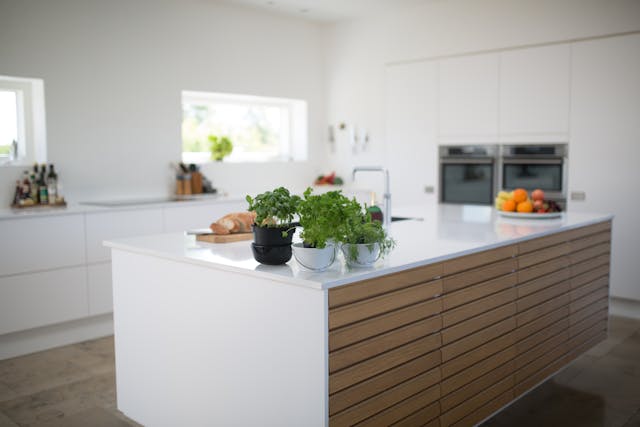Your kitchen is the heart of your home, a place where meals are created and memories are shared. It’s also a space where we can make a significant impact on the environment. Adopting eco-friendly practices in your kitchen isn’t just about cutting waste; it’s about creating a healthier home and planet. These practical ideas will show you how to make your kitchen greener, more sustainable, and more efficient, all while saving money and resources in the long run.
- Prioritize Energy-Efficient Appliances
Switching to energy-efficient appliances is one of the most impactful changes you can make. Modern refrigerators, ovens, and dishwashers with ENERGY STAR certification use less energy and water without compromising performance. By replacing outdated appliances, you’ll not only reduce your electricity bills but also lower your carbon footprint. Small changes, such as using LED lighting under your cabinets or for your fixtures, can add up over time. Always unplug appliances like toasters and microwaves when not in use to cut phantom energy consumption.
- Design Your Kitchen for Sustainability
A thoughtfully designed kitchen can encourage greener habits. If you’re planning a remodel, consider a custom kitchen that optimizes space while incorporating sustainable materials. Use reclaimed wood for cabinetry or opt for countertops made from recycled materials. Choose finishes and paints that are low in volatile organic compounds (VOCs) to improve indoor air quality. Install ample natural lighting and consider adding solar tubes to minimize the need for artificial light during the day. Layout choices that integrate recycling and composting systems seamlessly into the design make sustainable living easier and more convenient.
- Reduce Single-Use Plastics
Eliminating single-use plastics is a simple yet effective way to reduce waste. Start by switching from plastic wrap to reusable alternatives like beeswax wraps or silicone covers. Replace disposable plastic bags with washable, durable silicone ones or cloth options. Even common items like paper towels can be substituted with washable cloths or bamboo-based products. Store pantry staples in glass jars or metal containers instead of plastic. Keep reusable shopping bags handy and avoid purchasing products with excessive plastic packaging. These steps not only decrease waste but also contribute to a healthier kitchen environment.
- Embrace Composting
Composting turns food scraps into valuable nutrients for your garden while significantly reducing landfill waste. Set up a composting bin in your kitchen for vegetable peels, coffee grounds, and other organic materials. Choose a compact, odor-resistant bin if you have limited space. Educate everyone in your household on what can and cannot be composted. Composting reduces methane emissions from landfills and enriches soil for future use. Even if you don’t have a garden, many communities offer compost collection programs or drop-off points. By adopting this practice, you’ll help close the loop in your kitchen’s waste cycle.
- Opt for Sustainable Cleaning Products
Many conventional cleaning products contain harsh chemicals that harm both your health and the environment. Switching to eco-friendly alternatives is an easy and impactful change. Look for biodegradable dish soaps, natural all-purpose cleaners, and plant-based detergents. Or, go DIY and create your own solutions using simple ingredients like vinegar, baking soda, and essential oils. Swap disposable sponges with washable cloths or biodegradable options made from natural materials. Sustainable cleaning tools not only reduce waste but also improve indoor air quality, ensuring a safer kitchen for your family.
- Use Water Wisely
Water conservation is an essential part of creating an environmentally friendly kitchen. Start by fixing leaky faucets and ensuring your dishwasher and washing machine operate efficiently. If you handwash dishes, fill a basin instead of letting the water run continuously. Consider installing a low-flow faucet to reduce water waste without sacrificing pressure. Rinse vegetables in a bowl rather than under running water, and reuse that water for plants. Small habits, like scraping food off plates instead of rinsing them before placing them in the dishwasher, also save gallons of water over time. Every drop conserved helps protect this precious resource.
- Support Local and Organic Food
The food choices you make in your kitchen have a significant environmental impact. Support local farmers by purchasing seasonal produce, which requires less transportation and packaging. Look for organic options that are grown without harmful pesticides and chemicals. Buying in bulk is another great way to reduce waste, as it minimizes single-use packaging. Preserve freshness by using airtight containers for storage. Beyond shopping, try growing your own herbs or vegetables in your backyard or a small indoor garden. A kitchen that prioritizes local and organic food contributes to a more sustainable food system.
- Invest in Durable Cookware and Utensils
Choose quality over quantity when it comes to cookware and utensils. Invest in durable items like stainless steel pots, cast iron pans, and wooden or bamboo utensils. These materials last longer and are often more environmentally friendly than cheaper, plastic-based alternatives. Avoid nonstick coatings that may release harmful chemicals during use. Instead, opt for ceramic-coated or seasoned cast iron for a nonstick effect. Regularly maintain and care for your tools to extend their lifespan. By prioritizing durability and sustainability, you’ll reduce waste and save money in the long run.
- Minimize Food Waste
Food waste is a major issue in modern kitchens, but it’s one you can tackle with a few mindful changes. Start by planning your meals and shopping with a list to avoid overbuying. Store food properly to extend its shelf life, and get creative with leftovers to prevent them from going to waste. Use vegetable scraps to make stock, or freeze fruits for smoothies. Understanding expiration dates helps you discern between what’s still edible and what needs to be discarded. Compost what you can’t use, ensuring that even your food waste benefits the environment.
Creating an environmentally friendly kitchen doesn’t require a complete overhaul or a massive investment. Small, intentional changes, such as using water wisely, composting food scraps, and supporting local food, can have a meaningful impact on the planet. Whether you’re designing a custom kitchen or simply swapping out cleaning products, each step moves you closer to sustainability. By adopting these practices, you’ll create a greener, healthier home that supports a brighter future for everyone. An eco-friendly kitchen isn’t just good for the environment—it’s also good for your wallet and your well-being.




